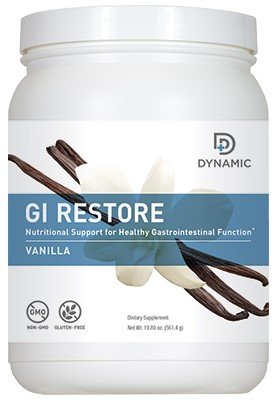7 Common Causes of Constipation & the Cure
Let’s talk about a subject that might make you squirm a little: bathroom troubles. We all need some help in that department from time to time. The unfortunate reality is that constipation has become a way of life for many Americans, leading them to rely on over-the-counter laxatives just to get through the day.
While laxatives can provide temporary relief, they can also create a dependency for them in your body. Over time, your body may become reliant on the stimulating effects, which can contribute to chronic constipation in the long run. It’s not a sustainable solution.
Constipation is never normal. If you’re experiencing it daily, it’s a clear sign that something is off in your gut. Using laxatives for short-term relief only masks the foundational problem and prevents you from uncovering the cause of your irregularity.
To get to the root of the issue, let’s explore 7 common causes of constipation. This will aid in identifying the factors impacting you.
Now, let’s delve into the facts about laxatives and constipation. Approximately 40% of Americans suffer from constipation and admit to relying on laxatives as a quick fix. This approach fails to address the underlying causes. The 7 Systems Plan gets to the root source. We evaluate each System, identify the imbalances or malfunctions, and then optimize them.
Conventional medicine often recommends over-the-counter laxatives and stool softeners for constipation relief. However, these can lead to long-term complications such as electrolyte imbalances, dehydration, and even more constipation. I recommend understanding the original causes of constipation and supporting healthy bowel patterns through natural means. I’ll share my number one tool for promoting healthy bowel patterns, shed light on how SIBO contributes to constipation, and discuss the 7 common causes.
Laxatives
Let’s address the problem with most laxatives. Nearly half of people with constipation turn to over-the-counter laxatives for quick relief. While they may seem to work well temporarily, their use has significant drawbacks. Laxatives can lead to dependency, rendering your body unable to have a bowel movement without them. Prolonged use can damage the nerves in your large intestine, causing chronic constipation.
Moreover, laxative use dehydrates your body by removing water, leading to a vicious cycle of diarrhea and further water loss. This process impacts kidney function and can leave you feeling fatigued. Diarrhea also disrupts electrolyte balance by causing sodium, potassium, and magnesium loss. This imbalance can affect your heartbeat and muscle contractions. In extreme cases, imbalanced electrolytes can lead to kidney damage.
Long-term laxative use is associated with irritable bowel syndrome (IBS). Symptoms of IBS can include abdominal pain and changes in bowel movements. Laxatives can impair normal muscle function and nerve response in the large intestine, hinder effective waste elimination, and leave stool lingering in the intestine for extended periods.
The good news is that you don’t have to rely on laxatives. Some alternatives can effectively address constipation. But before we discuss the solution, let’s talk about SIBO and its contribution to constipation.
SIBO
SIBO, or small intestinal bacterial overgrowth, occurs when the bacteria from your colon and large intestine migrate to your small intestines. Normally, most of your gut bacteria should reside in your large intestine and colon, where they help with digestion, vitamin synthesis, waste elimination, and much more. However, factors like medication use, including laxatives, or an unhealthy diet can disrupt the gut microbiome balance, leading to bacterial overgrowth in the small intestine.
Bacteria in the small intestine ferment undigested carbohydrates, releasing hydrogen and producing methane gas. Excess methane slows down the movement of the intestines, leading to a condition known as methane-dominant SIBO. This disruption can contribute to constipation by impairing the transit of stool through the Digestive System.
Addressing SIBO is crucial for restoring healthy bowel movements and relieving constipation. Treatment typically involves dietary changes, including targeted nutrients to support gut health. A detailed plan of action for this and other gut issues will be addressed in the next newsletter.
Now, let’s explore the 7 common causes of constipation:
1. Low Fiber Intake: A diet low in fiber can contribute to constipation. Fiber adds bulk to the stool by absorbing water and helps it move through the intestines more easily. Including high-fiber foods like fruits, vegetables, whole grains, and legumes can help promote regular bowel movements. Aim for at least 45 grams of fiber per day.
2. Dehydration: Insufficient water intake can lead to dehydration, making stools harder and more difficult to pass. Drinking adequate water throughout the day is essential for maintaining hydration and supporting healthy bowel movements. Drink half of your body weight in ounces of filtered water per day.
3. Sedentary Lifestyle: Lack of physical activity or prolonged sitting can slow down the natural contractions of the intestines, leading to constipation. Regular exercise and activity help stimulate bowel movements.
4. Medications: Certain medications, such as opioids, laxatives, antacids, antidepressants, and iron supplements, can disrupt gut flora and cause constipation. If you suspect medicine contributing to your constipation, consult your healthcare provider to explore alternative options or strategies to manage it.
5. Hormonal Changes: Hormonal fluctuations during pregnancy or menstrual cycles can affect bowel movements and lead to constipation. Managing hormonal imbalances and adopting strategies to support gut health can help alleviate constipation. Also, have your thyroid checked, as this can be a significant factor in bowel regularity.
6. Stress and Mental Health: Stress and mental health conditions like anxiety and depression can impact gut motility and contribute to constipation. Incorporating stress management techniques, seeking therapy or counseling, and adopting a holistic approach to mental health can support healthy bowel function.
7. Underlying Medical Conditions: Conditions like irritable bowel syndrome (IBS), hypothyroidism, diabetes, and neurological disorders can cause chronic constipation. Working with a healthcare provider is essential to identify and address any underlying conditions contributing to constipation.
In addition to addressing specific causes of constipation, be sure you optimize good health with probiotics, like UtraBiotic Daily Strain and the functional food Dynamic GI Restore.
My favorite go-to product for quick relief of constipation is Magnesium Citrate. This product stimulates the bowel muscles to move things along. It is safe, and we all need more magnesium than we typically get. Take one to three capsules per day as needed to get your colon to work daily.
Remember, it is always recommended to consult with a functional medicine provider to determine the underlying cause of your constipation and develop an individualized treatment plan. Your practitioner can provide guidance and support based on your unique situation and health needs.
I hope this information helps you better understand the relationships between laxatives, constipation, and natural approaches to promoting healthy bowel movements. If you continue struggling with constipation, check out the fantastic mini-course here.
Video of the Week:
Recipe of the Week:
Stock Up on Real Food







